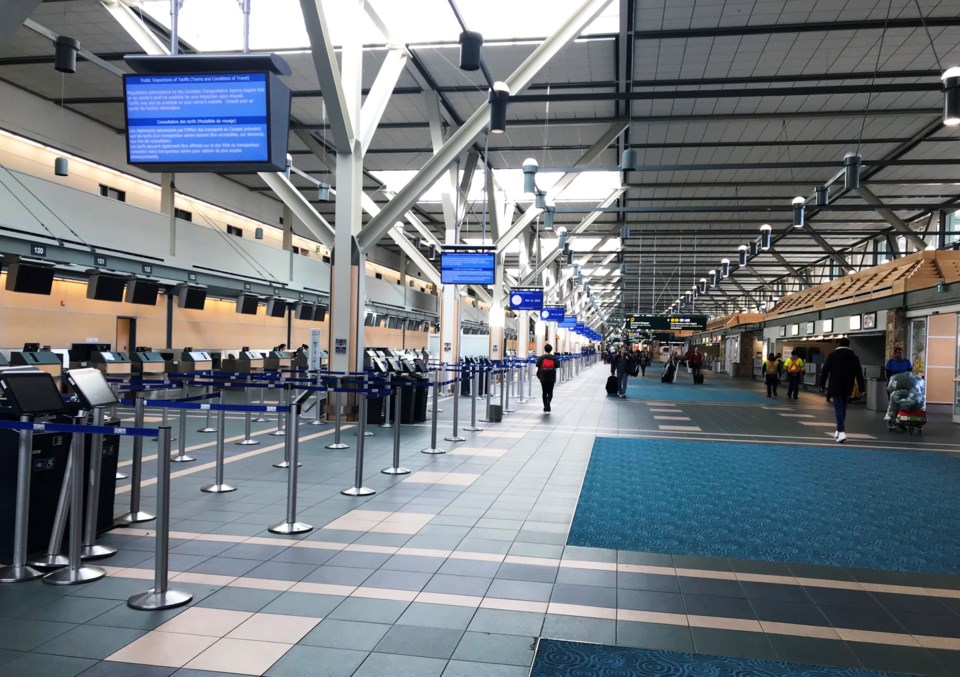The Vancouver International Airport saw its "year-over-year" passenger traffic drop by 72 per cent and it expects this year to be another challenging one because of fewer people choosing to travel by air.
A report that goes before Vancouver city council Tuesday doesn't say whether the drop was calculated for a full calendar or fiscal year, or whether the statistics date back to the declaration of the pandemic in March 2020, but said passenger traffic for the "year-over-year" time frame was 7.1 million.
Statistics on the airport's website show the number of "enplaned and deplaned" passengers for 2019 was 26,379,870. That volume of traffic decreased to 7,300,287 in 2020 and 4,991,843 from January to October of 2021; the November and December statistics have yet to be released.
The Vancouver airport and others in Canada don’t anticipate passenger numbers will return to pre-COVID-19 levels until 2025.
“We anticipate COVID-19 and its effects will endure for several years, and that the return of passenger traffic will be bumpy, slow and unpredictable,” said the report, which was released prior to a presentation Tuesday to council from Vancouver Airport Authority President and CEO Tamara Vrooman.
The airport began 2021 with the single biggest operating deficit and debt burden in the history of the facility and will continue to see operating losses this year. Such a financial hit occurred even with the federal government waiving and deferring rent payments.
“Pre-COVID, 90 per cent of our revenues were passenger-related,” the report said. “To future proof our financial stability in service to the community, we are exploring ways to diversify our revenue streams and better utilize our significant industrial land base.”
The report didn’t provide specifics, but suggested the airport could use some of the underutilized land on Sea Island to “help meet the need for large trade and transportation-related sites in support of B.C.’s economic recovery plans.”
While passenger traffic is down, the shipment of cargo has been more resilient through the pandemic, with summer 2021 cargo tonnage at 83 per cent of 2019 volumes. Some of that is a result of a change in people’s shopping habits.
“The surge in online shopping and e-commerce we experienced during COVID-19 is expected to sustain, elevating demand for the movement of goods and highlighting the vulnerability of existing supply chains,” said the report, adding it wants to work with the City of Vancouver and others to improve the efficiency of ground transportation between the airport and the region.
In 2021, the airport announced its commitment to achieve “net-zero carbon emissions” by 2030 and play a role in the “broader decarbonization of air travel, advancing clean technologies and supporting B.C.-based clean tech companies.”
For example, the report said, General Fusion — a global leader in fusion energy — announced in October 2021 that it will relocate its headquarters to Sea Island, where it will more than quadruple its workforce over the next few years.
“We are also working closely with our airline partners, and provincial and federal governments to advance policies needed to develop a production and supply chain of low carbon aviation fuel in British Columbia,” the report said. “Our vision is for YVR to be the first Canadian low carbon aviation fuel hub in Canada.”
That said, the report acknowledges aviation depends almost exclusively on fossil fuels.
“While airlines have made great strides in reducing fuel use by purchasing the latest and most fuel-efficient jets, airlines are faced with the reality that practical, lower and zero emission airplanes designed to carry hundreds of passengers long distances remain decades into the future,” the report said.
Meanwhile, the airport continues to host one of the largest COVID-19 testing facilities in the province. Vancouver Coastal Health operates the facility, which is on the site of the airport’s former jetSet parking lot.
Vancouver’s council meeting begins at 9:30 a.m. and will be livestreamed.
@Howellings




